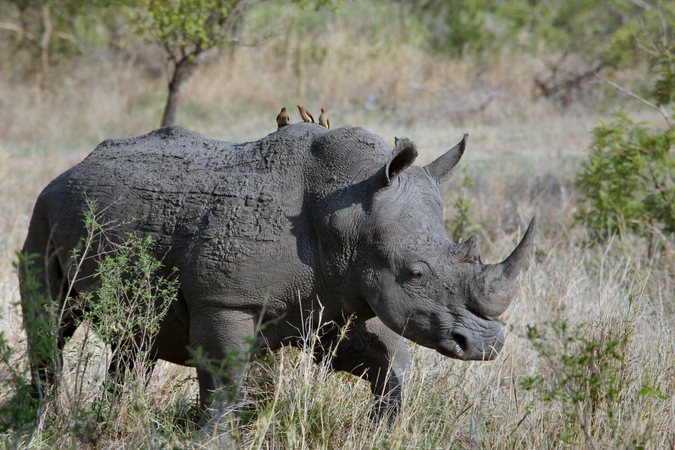Rhinos throughout South Africa are being brutally killed for their horns. In this article, I would like to focus on some of the positive contributions by the private sector and the trials and tribulations they face in trying to keep rhinos safe – including the need for sustainable funding of private rhino conservation.
Many articles in circulation paint a very negative picture of private rhino owners as greedy businessmen with no compassion. Although there are some bad apples in the private wildlife industry, these are certainly in the minority, and most private rhino owners have chosen their lifestyles (and livelihoods) based on a love of nature, the African bushveld, and wildlife.

Private reserve owners with rhinos protect their land with adequate fences, good technology and sufficient manpower – and they do so without assistance from taxpayer money, government or donors. So in essence, they are self-sufficient conservationists.
In 2016, 1054 rhinos were poached in South Africa, and of these, about 160 were on private land – about 15% of the total- which is proof that private rhino reserves are working very hard to keep their animals safe.
Private rhino reserves are staffed by tough, dedicated and professional people who strive for the health and well-being of many species of wildlife on the property. These people have years of experience in the bush and generally have a background in nature conservation studies – further testament to their passion for wildlife. These are the people who first come across cruelly poached rhinos and who often must deal with orphaned rhino calves, badly injured adult rhinos, and severely traumatised staff.
There are about 330 private rhino reserves in South Africa – home to about 6,500 rhinos – almost a third of the national rhino population, and more rhinos than all the rest of Africa combined. Since 2008, more than 70 private rhino owners have sold their rhinos and opted out of having them on their land. This is due to the ever-increasing risk to rhinos as well as to reserve employees from armed incursions by gangs who wish to kill the rhinos for their horns.
The levels of cruelty seen in rhino poaching incidents leave great emotional distress in their wake, both for the animals and the people who care for them. Numerous rhino owners, wildlife veterinarians, anti-poaching teams and others involved in rhino management are starting to speak out on the effects of these incidents on their psychological well-being – a terrible trauma to have to endure after seeing these animals grow up, play, breed and thrive on your own property.

For many private rhino owners, who run close-knit and often family-operated reserves, the idea of having to endure this is enough for them to sell their rhinos on to someone else, who may be better-equipped or in a better financial situation to be able to protect rhinos.
The costs of protecting rhinos have now reached exorbitant levels, with security measures amounting to considerably more than the overall expenses of general management and conservation of rhinos. Private rhino owners have spent more than R2 billion on rhino security over the past eight years. Without some means of generating these funds, more and more private rhino owners will sell or get rid of their rhinos.
Eco-tourism is a business option for a few private reserves, such as Phinda, Shamwari and Manyoni. Still, tourism is seasonal, and most tourists (national and international) visit national parks rather than smaller private reserves. Some reserves allow hunting to supplement income, but with regard to rhinos, this is not the norm – fewer than 80 rhinos were hunted in SA in 2016. Ideally, the buying and selling of live animals to other rhino owners and private and national reserves (for genetic diversity/population establishment, etc.) will bring in these funds. Still, with rhinos being so costly and difficult to protect, fewer people are willing to take them on. The value of live rhinos has dropped dramatically over the past few years.
If these rhino guardians and our national parks could sell their stockpiles of horn—a sustainable natural product that is humanely taken from rhinos—the money generated from these sales would go a long way towards keeping the rhinos and other wildlife on the reserve safe and encouraging more private wildlife reserve owners to invest in rhino conservation once more.
Also read: Private game reserves are vital for conservation
To comment on this story: Login (or sign up) to our app here - it's a troll-free safe place 🙂.![]()






